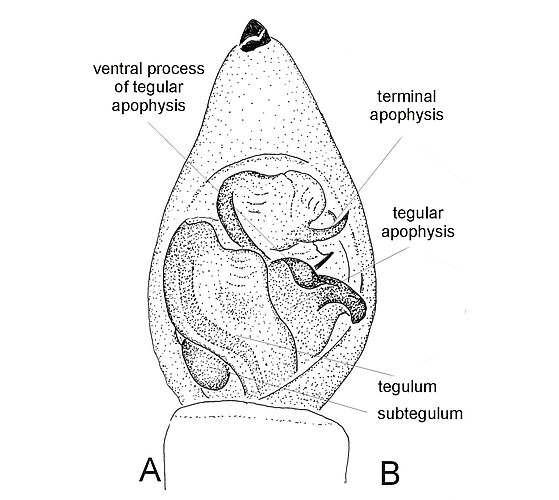Western Spring Huntress Venatrix tinfos Framenau, 2006
Fauna Portal species: 7789Diagnosis
(after Framenau 2006): Venatrix tinfos is very similar to V. fontis from eastern Australia with a similar unusual leg formula of IV>I>III>II, i.e. the third leg is longer than the second leg (all other Venatrix have IV>I>II>III). The male pedipalps of both species are extremely similar. However, the inner edge of the ventral process of the tegular apophysis forms a right angle with the tegular apophysis in V. tinfos when viewed from the tip of the cymbium. This angle is distinctly smaller than 90 degrees in V. fontis, i.e. the ventral process appears much more acute. Females can be distinguished by the anchor-shape of the median septum in comparison to the inverted T-shaped median septum of V. fontis.
Status
- native
Linnean Holotype
Australia
- Western Australia
Fauna Portal Records
The map shows all records that have been verified as part of the Fauna Portal project and may not represent the true distribution of a species. Specifically, for described species, check the link to the Atlas of Living Australia on this page for potential wider distributions. Fauna Portal Reference specimens and Linnean types are shown in red. If you identified a specimen that exceeds the distribution of an undescribed species as illustrated here, please contact the Fauna Portal team who can assist with the lodgement of the specimen in a public institution and display on the map.
Publications
Framenau VW (2006): The wolf spider genus Venatrix Roewer: new species, synonymies and generic transfers (Araneae, Lycosidae). Records of the Western Australian Museum. 23: 145 - 166WEB
Araneae (Spiders)
- Actinopodidae
- Anamidae
- Araneae fam. indet.
- Araneidae
- Archaeidae
- Argyronetidae
- Arkyidae
- Barychelidae
- Cheiracanthiidae
- Clubionidae
- Corinnidae
- Cycloctenidae
- Deinopidae
- Desidae
- Dictynidae
- Filistatidae
- Gnaphosidae
- Halonoproctidae
- Hersiliidae
- Idiopidae
- Lamponidae
- Linyphiidae
- Lycosidae
- Allotrochosina
- Anomalosa
- Artoria
- Artoriopsis
- Costacosa
- Diahogna
- Dingosa
- Genus 2556 (ariadnae grp)
- Genus 3448 (leonhardii gp)
- Genus 3491 (laeta grp)
- Genus 3643 (yalkara grp)
- Hoggicosa
- Hogna
- Kangarosa
- Knoelle
- Kochosa
- Lycosidae gen. indet.
- Mainosa
- Portacosa
- Tapetosa
- Tasmanicosa
- Tetralycosa
- Tuberculosa
- Venator
- Venatrix
- Venonia
- Zoica
- Allotrochosina
- Mimetidae
- Miturgidae
- Mysmenidae
- Nicodamidae
- Oecobiidae
- Oonopidae
- Oxyopidae
- Philodromidae
- Pholcidae
- Pisauridae
- Prodidomidae
- Salticidae
- Scytodidae
- Segestriidae
- Selenopidae
- Sparassidae
- Symphytognathidae
- Tetrablemmidae
- Tetragnathidae
- Theridiidae
- Thomisidae
- Trachelidae
- Trachycosmidae
- Trochanteriidae
- Uloboridae
- Zodariidae
- Zoropsidae
All classes
- Arachnida
- Crustacea
- Entognatha
- Gastropoda
- Insecta
- Orthoptera - Caelifera (Grasshoppers)
- Hymenoptera excl. Formicidae (bees and wasps)
- Blattodea s. str. (Cockroaches)
- Coleoptera (Beetles)
- Dermaptera (earwigs)
- Diptera (flies, mosquitos)
- Entomobryomorpha (slender springtails)
- Hemiptera - Heteroptera (True Bugs)
- Hemiptera - Sternorrhyncha (aphids, scales etc.)
- Hemiptera - Auchenorrhyncha (cicadas, planthoppers)
- Hymenoptera - Formicidae (Ants)
- Trichoptera (Caddisflies)
- Zygentoma (silverfish)
- Myriapoda

